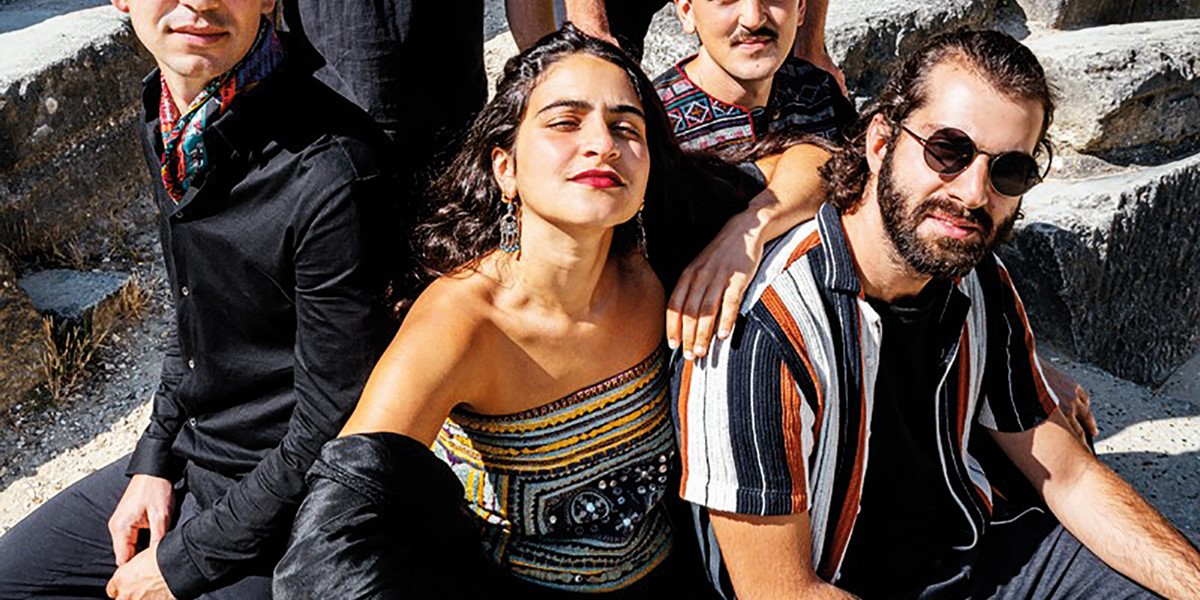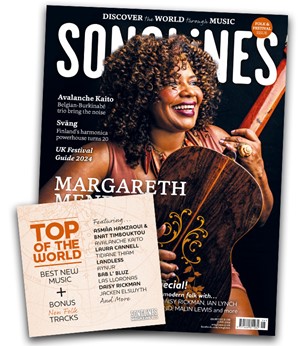Friday, May 3, 2024
Sarāb: “We try to find harmony and balance in the songs, and between us as human beings”
Megan Iacobini de Fazio meets the France-based collective Sarāb – uniting Middle Eastern traditions with contemporary jazz, climate activism and intense live shows

In Arabic, Sarāb means ‘mirage’ – a fitting name for a group that has been hard to pin down since coming together in 2018. Born out of a chance meeting between Franco-Syrian singer Climène Zarkan and French guitarist Baptiste Ferrandis, the band has grown into a six-piece collective, their sound branching out in a multitude of directions. Keeping their hearts and ears open to the world around them, Sarāb draw on rock, contemporary jazz and traditional Arabic music to build a feverish, sometimes hallucinogenic, frenzy of rhythms and melodies, propelled by their endless curiosity and deep commitment to social justice.
Zarkan was raised between Damascus and France and is the daughter of renowned Syrian composer and oud player Bachar Zarkan. Though she grew up immersed in traditional Arab music, she initially played the piano and trained as a classical musician. “I only began singing when I was 22 or 23, so it took a long time for me to come back to this part of my life.”
It was Zarkan who introduced Ferrandis to Arabic music through her father’s songs. “My background is in rock and hard rock, so it was something totally strange and new,” he recalls. “I am still discovering and learning, which I will be doing for all my life. I try to be humble and find new treasures in this culture, trying to understand it through my Western brain.”
They began as a duo, rearranging traditional Arabic songs, but realised soon enough that their vision called for a bigger, more kaleidoscopic sound. They assembled their band and “it worked right away,” recalls Ferrandis.
Their self-titled 2019 debut includes several reinterpretations of traditional songs, many of which are about love, except the hauntingly beautiful ‘Tiri’, about Palestinian freedom. By the time their second album Arwāh Hurra – Âmes Libres was released in 2021, Sarāb were working as a true collective, with each musician contributing their own perspective. “Climène and I usually have a vision of what we want to do, but then we bring in everyone else’s ideas, because we really respect their ways of thinking. So, even if we arrive somewhere completely different, it’s perfect because we got there together,” says Ferrandis. “We try to find harmony and balance in the songs, and between us as human beings.”
This harmony is apparent on their latest release, Qawalebese Tape (2023), which honours the Egyptian and Syrian repertoires it draws on, while providing each musician ample freedom of expression. ‘Zourouni’ pays tribute to Egyptian composer Sayed Darwish, starting with Zarkan’s tender vocals floating over a sunlit soundscape, accompanied by languid trombone and dreamlike textures, before exploding into a joyous whirlwind of psychedelic keys and percussion.
With each new release Sarāb have become more secure, not only in their sound but in what they want to transmit to the world. “It’s important for us that our music has a message. I’m a woman and Arab, so my life is naturally political,” says Zarkan. On ‘Samt’ she draws from a poem by Syrian writer Maram al-Masri (whose words are borrowed for many songs on the album) to talk about exile and the bittersweet memories of home, while Ferrandis, inspired by the writing of James C Scott, examines the oppression inherent in our industrial society on the rousing ‘Queen Rast’.
Sarāb have frequently addressed the climate crisis in their music, and in May they will be taking part in a pilot for a new model of sustainable touring funded by the European Jazz Network’s Green Pilot Tour Fund, travelling by train between concerts in the Netherlands and the UK to minimise the ecological impact on the planet.
For the band, playing live is always an opportunity to champion the causes closest to their heart: “We wrote a new song about what is going on in Palestine,” says Zarkan, “and we talk about this at every concert. It starts from an old Palestinian resistance song that was written after British colonisation, and then moves on to calls for ceasefire and a free Palestine. Because it’s important to be precise: this is what we are asking for.”
Sarāb play Manchester Jazz Festival (May 25), The Glasshouse, Gateshead (May 26), Ronnie Scott’s, London (May 27) and Howard Assembly Rooms, Leeds (May 28)
This article originally appeared in the June 2024 issue of Songlines. Never miss an issue – subscribe today

